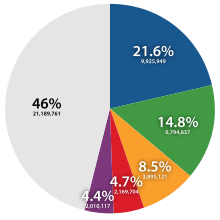Choi (Korean surname)
| Choi | |
|---|---|
| Family name | |
| Pronunciation | Ch'oe, Tchoi, Chye |
| Meaning | pinnacle, top, most, mountain |
| Region of origin | Korea |
| Language(s) of origin | Korean |
| Related names | Cui, Thôi |
| Choi | |
| Hangul | 최 |
|---|---|
| Hanja | 崔 |
| Revised Romanization | Choe |
| McCune–Reischauer | Ch'oe |

Choi is a common Korean family name. In English speaking countries, it is most often anglicized Choi, and sometimes also Choe. Ethnic Koreans in the former USSR prefer the form Tsoi (Tsoy) especially as a transcription of the Cyrillic Цой.
Origin
- According to Samguk Sagi, the Gyeongju clan originates from chief Sobeoldori (소벌도리, 蘇伐都利) of Goheochon (고허촌, 高墟村), one of six villages that united to found Silla; The Gyeongju clan traces their origin back to Choi Chiwon (857–10th century), a noted Korean scholar, philosopher, and poet of the late Unified Silla period (668–935).
- The Haeju clan is an offshoot of the Gyeongju clan; one theory of origin suggests that Haeju clan's progenitor Choi Choong (최충, 崔沖, 984–1068) was given the surname 崔 during the reign of Goryeo king Mokjong.
- The progenitor of the Chungju clan is General Choi Seung (최승, 崔陞), also known as Choi Woo (최우, 崔偶), of Silla (known as Cui Sheng in Tang Dynasty)
- The progenitor of the Nangju clan is Choi Heun (최흔, 崔昕) of Silla who was a native of Yeongam (Nangju) of the southern Jeolla region.
- Choi Ri (최리, 崔理) was the leader of the Lelang Commandery of the Han Dynasty.
Clans
There are roughly 160 clans of Chois. Most of these are quite small. However, Choi is the 4th most common surname in Korea. The largest by far is the Gyeongju Choi clan, with a 2000 South Korean population of 976,820. The Gyeongju Choe claim the Silla scholar Choe Chi-won as their founder.[1]
- Gyeongju clan[1] - Choe Chiwon
- Jeonju clan[1] - Choe Bu
- Dongju clan[1]
- Haeju clan[1]
- Saknyeong clan[1] - Choe Hang, Choi Byung Ju (founding member modern era Korean Supreme Court)
- Gangneung clan[1]
- Hwasun clan[1]
- Ganghwa clan[1]
- Yeongcheon clan[1]
- Tamjin clan[1]
- Ubong clan[1] - Choe Hang
- Suwaon clan[1]
- Yeongheung clan[1]
- Suseong clan[1]
- Chungju clan[1]
- Goesan clan - Choe Sejin[2]
- Heunghae clan
- Yeongam clan
Etymology
Choi (Hangul: 최) is written with the Hanja character 崔, meaning "a governor who oversees the land and the mountain". The surname Choi also means mountain or pinnacle.
Choi (崔), originally written in Hanja, is derived from the combination of 2 ancient Chinese characters:
Pronunciation
In Korean, 최 is usually pronounced [tɕʰwe] except by some older speakers who pronounce it [tɕʰø] (this vowel sound is similar to the German ö [ø]). In English, it is most often pronounced /ˈtʃɔɪ/ "Choy".
崔 is Romanized as Cuī and pronounced [tsʰu̯éi̯] in Mandarin Chinese. It is Cheuī [tsʰɵ́y] in Cantonese and Chhui [tsʰuí] in Hokkien.
Prominent people

- Anita Tsoi (Choi Hae-soo), Russian pop singer, wife of Sergey Tsoy
- Ashley Choi (Choi Bi-na, Stage name: Ashley), member and leader of South Korean girl group Ladies' Code
- Choi Cheol-han, South Korean professional Go player
- Choi Chol-su, North Korean boxer
- Choe Chung-heon, military dictator of the Goryeo period
- Dan Choi, American LGBT rights activist and former American officer
- David Choi, Korean-American singer popular in YouTube
- Choi Dong-wook, stage name Se7en, South Korean singer
- Choi Eun-hee, South Korean actress once abducted to the North
- Choi Eun-kyung, South Korean speedskater
- Choi Eun-kyung, South Korean field hockey player
- Choi Gee-sung, high-ranking Samsung executive
- Gina Choi, stage name G.NA, Korean-Canadian K-pop singer
- Choi Han, South Korean voice actor
- Choi Han-bit, South Korean model
- Hansol Vernon Choi, rapper of South Korean boy group Seventeen (band)
- Choi Hee-seop, a South Korean baseball player
- Choi Hong Hi, South Korean general considered the principal founder of taekwondo
- Choi Hong-man, South Korean kickboxer
- Choi Hwee-sung, stage name Wheesung, South Korean singer
- Jay Pil Choi, American economist
- Jennifer Choi, American violinist
- Jenny Choi, American singer and cellist
- Choi Ji-woo, South Korean actress
- Choi Jin-cheul, K-League footballer
- Choi Jin-ri, stage name Sulli, actress and former member of South Korean girl group f(x)
- Choi Jin-sil (1968-2008), South Korean actress, nicknamed "The Nation's Actress"
- Choi Jong-hoon, member of South Korean rock band F.T. Island
- Choe Jun (1884-1970), businessman and philanthropist
- Choi Jun-hong, stage name Zelo, member of South Korean boy band B.A.P
- Choi Jung-won, South Korean actress
- Choi Jung-won, South Korean singer
- Choi Jung-won, South Korean speed skater
- Choi Jung-yoon, South Korean actress
- Kenneth Choi, American actor
- Choi Kwang Jo Creator of Choi Kwang Do
- Choi Kyoung-hwan, South Korean politician
- K. J. Choi (Choi Kyung-ju), professional golfer
- Choi Kyu-hah (1919-2006), transitional President of South Korea following the assassination of Park Chung-hee
- Choe Manri, an early critic of hangul
- Choi Minho, member of South Korean boy band SHINee
- Choi Min-hwan, drummer and member of South Korean band F.T. Island
- Choi Minki, stage name Ren, member of South Korean boy band NU'EST
- Choi Min-sik, South Korean actor
- Choe Mu-seon, 14th-century Korean inventor
- Choe Myong-ho, North Korean football player
- Choi Myung-hoon, South Korean professional Go player
- Choe Nam-seon (1890-1957), Korean historian and independence activist
- Choi Na-yeon, South Korean female professional golfer
- Choi Sang-ki, South Korean voice actor
- Choe Sejin, 15th-century linguist
- Choi Seong-woo, South Korean voice actor
- Sergey Tsoy (Choi Yong-eun), Russian politician
- Choi Seung-hyun, stage name T.O.P, actor and member of South Korean boy band Big Bang
- Choi Seung-cheol, stage name S.Coups, leader and rapper of South Korean boy group Seventeen (band)
- Choi Siwon, actor and member of South Korean boy band Super Junior
- Choi Soo-jin, South Korean voice actress
- Choi Sooyoung, actress and member of South Korean girl group Girls' Generation
- Steven Choi, American politician
- Choe Sung-chol, former vice chairman of the DPRK Asia-Pacific Peace Committee; as of 2008, he was purged and is undergoing “severe” communist training at a North Korean chicken farm[3]
- Choi Sungmin, member of South Korean boy band Speed
- Choi Sung-hee, stage name Bada, singer and musical theatre actress
- Choi Sung-kuk, K-League footballer
- Choi Sung-yong, K-League footballer
- Susan Choi, American novelist
- Choi Tae-uk, J-League footballer
- Choe U (d. 1249), military dictator of the Goryeo period
- Viсtor Tsoi, Soviet rock musician, leader of rock band Kino
- Choi Won-hyeong, South Korean voice actor
- Choi Won-jong, Korean international archer
- Choi Won-kwon, K-league footballer
- Choi Woo-hyuk, South Korean actor
- Choi Woo-hyuk, South Korean actor
- Choi Woo-shik, South Korean actor
- Choi Yang-il, aka Yoichi Sai, Japanese film director
- Choi Yeon-sung, professional StarCraft player
- Choe Yeong (1316–1388), aka Choi Young, military general under King Gongmin of Goryeo
- Choe Yeong-ui, founder of Kyokushin karate, better known as Masutatsu Oyama
- Choi Yong-kun (1903-1972), high-ranking North Korean official
- Choi Yong-soo, J-League footballer
- Choi Yong-soo, South Korean boxer
- Choi Yong-sool, founder of hapkido
- Choi Young-jae, or Youngjae, member of South Korean boy group Got7
- Choi Yoojin, member of South Korean girl group CLC
- Choi Yun-kyum, football coach
- Cui (Choi) Jian, Chinese rock musician
- Choi Song, Hawaii Marketer
- Shanna Choi, Headhunter Philippines and China
- Sean Choi, Program Controller
See also
- Cui – Chinese surname
- Choi
- Tsoi
- List of Korea-related topics
- List of Korean family names
References
- 1 2 3 4 5 6 7 8 9 10 11 12 13 14 15 16 최 崔 [Choe] (in Korean). Doosan Encyclopedia. Retrieved 2009-09-18.
- ↑ 최세진 崔世珍 [Choe Se-jin] (in Korean). Encyclopedia of Korean Culture. Retrieved 2009-09-18.
- ↑ "Top North official said to be getting re-educated". JoongAng Ilbo. 12 January 2009. Retrieved 2013-05-20.